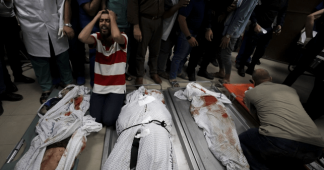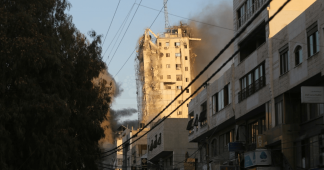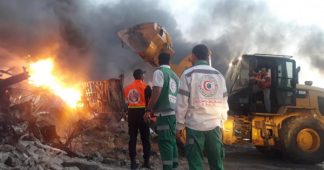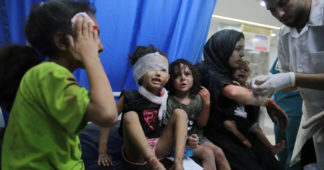Children’s innocent questions echo with the weight of the world: will we be killed under the cover of night, or in the morning?
By Ghada Abed|
Oct 11, 2023
Across Gaza, harrowing days stretch into terrifying nights. More than 1000 Palestinians have died in the latest round of Israeli air strikes, including shocking massacres in Shati refugee camp, Jabalia camp and Khan Younis.
In just four days, the landscape of Gaza has been dramatically transformed. Entire residential complexes have vanished, making it difficult to recognise familiar surroundings. The Israeli onslaught has painted a dystopian and apocalyptic picture of the busiest and most crowded areas of the Gaza Strip.
“I cannot believe that we have awoken to a new day to live. We saw the horrors of death being unfolded before our own eyes,” Arwa, a 33-year-old resident of Gaza, told Middle East Eye.
Before her own home in Rimal neighbourhood was bombed with only minutes of warning, she ran with her family to huddle in the basement of a nearby building.
“We saw death, literally death. The sky glowed red, and the smell of gunpowder engulfed us,” she said. “Debris from shattered stones and broken glass was strewn everywhere. It did not stop. Women cried. Children yelled. With morning’s arrival, I ventured to see what remained of my apartment, only to find it obliterated.”
This state of war did not start four days ago. Palestinians in Gaza endure a constant state of uncertainty and war. We bear the heavy weight of previous battles, alongside constant Israeli violations. Israel’s impunity has been absolute in the wake of previous wars, and the 16-year siege of Gaza has been met with international silence.
Today, the constant presence of drones buzzing overhead adds to our unease. They have never truly left our skies, but over the past few days, they have grown louder and more dangerous. On social media, many friends share heartbreaking news of the loss of their loved ones. Some plead for assistance, as people remain trapped beneath the rubble.
Farewell messages
As Israel appears to be preparing for a ground invasion, many people have been reflecting on the possibility of death, wondering what could happen and issuing heartfelt prayers. Many of my friends have sent farewell messages, seeking forgiveness from those they might have wronged. It feels as though a day of reckoning is drawing near.
Children’s innocent questions echo with the weight of the world: Why do they kill us? When will they kill us? Will it be painful to be killed? How does it feel? Are we going to die all at once, or one by one? Are you coming with us? Will we be killed under the cover of night, or in the morning?
If we need to evacuate, my sister-in-law has asked me to take care of her younger daughter, while she looks after her other two children. Another friend has already seen her apartment destroyed, after having just moved in. I remember her optimistic words before the war: “We should celebrate. You must come and visit my new apartment, see all that we’ve got.” All of that is now gone.
Since the start of 2023, a staggering number of Palestinians have lost their lives, with many more injured. Patients in Gaza routinely die while waiting for permits to seek medical care in Israel, whose forces control the Erez crossing, the primary gateway between Gaza and the outside world.
What deeply bothers me is the world’s misconception that we have grown immune, or resilient enough to endure any horrors that come our way.
Yes, we have exhibited remarkable resilience in adapting to difficult situations – but this does not mean that we can endure any more. We have not become desensitised; rather, we strive to navigate the daily challenges imposed upon us. Our resilience is born out of necessity, as we endeavour to protect and provide for our families.
‘Relentless bombardment’
When resistance erupts, Palestinians often find themselves subjected to blame. They are held responsible for their own deaths, for their own existence. But what options are left?
For 16 years, two million people in Gaza have been living under an oppressive siege that paralyses every aspect of life. Power outages, fuel shortages, restricted movement – the list of hardships is endless. In the face of such adversity, should the Palestinian people remain silent, counting whatever blessings they can find, and express gratitude to the occupier for merely allowing them to breathe?
No matter what the coming days may hold, Palestinians are plagued by a profound sense of betrayal from the global community. They feel as though they have been erased from the world’s consciousness. As the cries of our children are heard around the world, the response from the international community seems indifferent.
This is especially disheartening when contrasted with the extensive attention and support given to Israelis or Ukrainians. Despite the theoretically universal principle of equality, certain populations in the world are afforded more rights, attention and support than others. Meanwhile, Palestinians find themselves marginalised and disregarded in the face of their ongoing struggle for justice.
For Mohammad, a 40-year-old father who lives in Gaza’s Rimal neighbourhood, memories of the 2014 war are still fresh in his mind, even as he struggles to make sense of the current onslaught.
“There was an overwhelming and relentless bombardment happening all around us,” Mohammad told MEE of the latest air raid on his neighbourhood. “The intensity was unimaginable. It is crazy, and the atmosphere was filled with the scent of gunfire … We feel helpless in front of our children’s questions.”
We remind our readers that publication of articles on our site does not mean that we agree with what is written. Our policy is to publish anything which we consider of interest, so as to assist our readers in forming their opinions. Sometimes we even publish articles with which we totally disagree, since we believe it is important for our readers to be informed on as wide a spectrum of views as possible.











